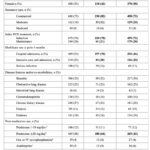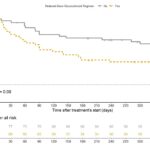SAN DIEGO—The large vessel vasculitides, including Takayasu’s arteritis and giant cell arteritis, experienced a surge of interest at ACR Convergence 2023. Here, we highlight important points from 10 of the studies presented at this conference.


Philip Seo, MD, MHS |
SAN DIEGO—The large vessel vasculitides, including Takayasu’s arteritis and giant cell arteritis, experienced a surge of interest at ACR Convergence 2023. Here, we highlight important points from 10 of the studies presented at this conference.

SAN DIEGO—In their study, Effect of Trimethoprim Sulfamethoxazole Prophylaxis on Infections During Treatment of Granulomatosis with Polyangiitis with Rituximab: A Population-Based Study, Mendel et al. assessed the relationship between trimethoprim sulfamethoxazole (TMP-SMX) and infection in patients undergoing treatment for granulomatosis with polyangiitis (GPA). Background/Purpose Infections during treatment of anti-neutrophil cytoplasmic antibody (ANCA) associated vasculitis (AAV)…

SAN DIEGO—In a study titled Real-Life Use of the PEXIVAS Reduced-dose Glucocorticoid Regimen in Granulomatosis with Polyangiitis and Microscopic Polyangiitis, Nagle et al. evaluated the efficacy and safety of the reduced-dose glucocorticoid regimen in a real-world setting. Background/Purpose Glucocorticoids (GCs) in combination with rituximab (RTX) or cyclophosphamide are the cornerstone of treatment for patients with…

SAN DIEGO—Too many excellent pediatric rheumatology studies to squeeze into one talk? What a good problem to have. Dr. Ardoin first highlighted baricitinib in juvenile idiopathic arthritis.

SAN DIEGO—The understanding of the microenvironment in which immune cells interact with stromal cells in the synovium of psoriatic arthritis (PsA) and rheumatoid arthritis (RA) is deepening, potentially giving clues for treatments. As this understanding improves, so does the appreciation for its astounding complexity, an expert said here in a session at ACR Convergence, which…

SAN DIEGO—Viral infections are a common cause of acute arthritis and, in general, tend to be short lived and are not usually associated with significant articular inflammation. Due to the prevalence of various viral infections across the globe, any patient with signs of early inflammatory arthritis (i.e., symptoms that have not yet lasted six weeks) should be evaluated for a possible infectious etiology, said Dr. Leonard Calabrese in the Review Course at ACR Convergence 2023.

SAN DIEGO—In the Review Course at ACR Convergence 2023, Dr. Megan Clowse spoke on the subject of reproductive counseling for patients with rheumatic conditions, a topic that has been the focus of much of her research and scholarship.

Philip Seo, MD, MHS |
SAN DIEGO—Vasculitis expert and former editor of The Rheumatologist, Dr. Philip Seo gives us his picks for the 10 most important abstracts in ANCA-associated vasculitis to come out of ACR Convergence 2023.
SAN DIEGO—In an advocacy update session at ACR Convergence 2023, ACR staff described progress in multiple priority areas, including access to care and workforce issues.

Updates from the ACR Convergence 2023 Review Course, part 6 SAN DIEGO—The pre-conference Review Course at ACR Convergence 2023, held Saturday, Nov. 11, and moderated by Noelle Rolle, MBBS, assistant professor in the Division of Rheumatology, associate program director of the Rheumatology Fellowship at the Medical College of Georgia, Augusta University, and Julia Schwartzmann-Morris, MD,…